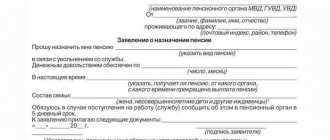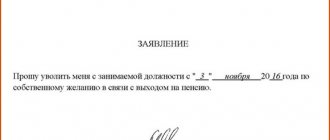Every citizen of the Russian Federation has the right to an old-age pension in the event of loss of legal capacity, disability, loss of a breadwinner and the impossibility of supporting oneself independently. This right is provided for by Law F3 No. 166, the main document in force since January 1, 2002.
Payments for citizens are provided both from the state treasury and from the Federal budget of the country. A list of persons entitled to this assistance and the amounts of payments are indicated. The essence of the pension system is the distribution of contributions deducted from the salaries of able-bodied citizens.
But, due to the predominance of the majority of pensioners in relation to the working population, for the latter persons the financial burden has become significant. The system has been in place since Soviet times, is outdated and requires reforms and a way out of the current situation. The authorities found a way out by creating a savings system, thanks to which everyone can accumulate money for their old age by making monthly contributions to the pension fund on their own.
Both pensions: funded and state pensions are valid today in the country.
State pension provision
F3 166 was adopted in accordance with the Constitution of the Russian Federation. Pensions are assigned and paid based on the law. The law may be amended, changed and supplemented to take into account inflation. The Government of the Russian Federation establishes the procedure for exercising the rights to receive pensions, the conditions for assigning pensions for all citizens, the categories of which are indicated in the law.
According to Art. 27 previously accrued pensions before the entry into force of the New Law are preserved and indexed in accordance with this law. If the previously accrued pension amount exceeds the norm specified in this law, then it is also paid in the same high amount.
Citizens who previously received a pension before the adoption of the new law upon reaching the ages of 60 and 65 years for women and men can receive a pension in the same amount and in the same manner.
Based on Art. 28 defines the procedure for payments for foreign citizens living in the country with a residence permit, or due to service in the Russian Federation. Pensions are also provided for their family members.
The provisions of the law apply to foreign citizens performing military service in the ranks of the armed forces of the Russian Federation, other troops, military units, as well as to members of their families.
Federal Law of 06/08/2020 No. 166-FZ
Introduce into the Federal Law of October 26, 2002 No. 127-FZ “On Insolvency (Bankruptcy)” (Collected Legislation of the Russian Federation, 2002, No. 43, Art. 4190; 2020, No. 1, Art. 29; No. 27, Art. 3945 ; 2020, No. 31, Article 4830; 2020, No. 14, Article 2028; Rossiyskaya Gazeta, 2020, April 29) the following changes:
1) Article 9.1 shall be supplemented with paragraphs 3.1 – 3.5 as follows:
"3.1. If, based on an application submitted during the moratorium period by a debtor - an individual entrepreneur who is subject to the moratorium, a procedure for restructuring the debts of a citizen has been introduced, or based on an application submitted during the moratorium period by a debtor - a legal entity subject to the moratorium, a monitoring procedure has been introduced, such Debtors, no earlier than the date of the first meeting of creditors, have the right to apply to the arbitration court with an application for the provision of a judicial installment plan. In this case, the following conditions must be met:
1) the debtor’s income for the reporting period of the calendar year in which the bankruptcy case was initiated is twenty percent or more lower than the debtor’s income for the same period of the previous calendar year. If at the time of initiation of the debtor's bankruptcy case not a single reporting period has expired, the debtor's income for the two years preceding the year of initiation of the bankruptcy case is compared;
2) there is no debt on the claims of citizens to whom the debtor is liable for causing harm to life or health, as well as arrears in payment of severance pay and (or) wages for persons working or who worked under an employment contract;
3) the meeting of creditors decided not to enter into a settlement agreement or refrained from making such a decision;
4) there are no applications from creditors to declare the debtor bankrupt, filed before the date of introduction of the moratorium and returned by the arbitration court in accordance with paragraph 2 of this article;
5) the debtor’s application for declaring him bankrupt was filed no earlier than one month after the date of introduction of the moratorium.
3.2. The terms of the judicial installment plan specified in paragraph 3.1 of this article must provide for:
1) changing the deadlines for payment of obligations that are overdue on the date of initiation of bankruptcy proceedings, as well as obligations subject to inclusion in the register of creditors’ claims, the due date of which occurs no later than one year from the date of granting the judicial installment plan;
2) fulfillment of the obligations specified in subparagraph 1 of this paragraph in equal monthly installments for one year;
3) the right of access of creditors, the amount of claims of each of which exceeds ten percent of the total debt (except for persons interested in the debtor) included in the register of creditors’ claims, to information about the property, property rights and obligations of the debtor during the validity period of the judicial installment plan and the debtor's obligation to provide it to the specified creditors within a reasonable time;
4) accrual of interest stipulated by the agreement for the period of validity of the judicial installment plan exceeding one year (if the accrual of such interest is not provided for in the agreement, interest is accrued in the amount of the key rate of the Bank of Russia in force during the period of validity of the judicial installment plan);
5) the debtor’s obligation to provide the creditors specified in subparagraph 3 of this paragraph with a report on the execution of the judicial installment plan at least once a quarter;
6) the occurrence of the consequences provided for in paragraphs five and seven to ten of paragraph 1 of Article 63 of this Federal Law;
7) termination of enforcement proceedings on property penalties for claims that arose before the provision of judicial installment plans.
3.3. The fulfillment of part of the obligations that are subject to inclusion in the register of creditors' claims, which are not subject to judicial installment plans, is carried out within the time limits specified in the relevant agreements, or within the time limits established by law.
The periods specified in subparagraphs 1 and 2 of paragraph 3.2 of this article are two years if the debtor’s income for the reporting period of the calendar year in which the bankruptcy case was filed is fifty percent or more lower than the debtor’s income for the same period of the previous calendar year. If at the time of initiation of bankruptcy proceedings no reporting period has expired, the debtor’s income for the two years preceding the year of initiation of bankruptcy proceedings is compared.
If the debtor belongs to strategic enterprises and organizations and there are circumstances provided for in paragraph two of this paragraph, the specified periods are three years.
3.4. When granting a judicial installment plan for the periods specified in paragraphs two and three of clause 3.3 of this article, the debtor must provide creditors whose claims are not secured by a pledge of the debtor’s property with security in the form of a bank guarantee and (or) a pledge of the property of the debtor or third parties, the market value of which must be determined by the appraiser.
3.5. Judicial installment payment applies to the claims of all creditors, including those not included in the register of creditors’ claims (regardless of the terms of the agreement providing for early deadlines for fulfillment of obligations and other unfavorable consequences for the debtor due to changes in his financial condition, violation of the payment schedule and (or) introduction in relation to the debtor of the procedure applied in a bankruptcy case).
Based on the debtor’s application for the provision of a judicial installment plan, the arbitration court issues a ruling containing the conditions for the provision of a judicial installment plan, and the bankruptcy proceedings are terminated. The ruling to grant a judicial installment plan may be appealed.
In case of non-compliance with the terms of the judicial installment plan, the arbitration court, at the request of creditors, issues a ruling to cancel the judicial installment plan in relation to all creditors, and the bankruptcy proceedings are resumed, except for cases where the procedure applied in a new bankruptcy case has been introduced in relation to the debtor.
When bankruptcy proceedings are resumed, a procedure is introduced against the debtor that is applied in the bankruptcy case and during which the judicial installment plan was granted.
If an arbitration court makes a ruling to cancel the judicial installment plan or initiate a new bankruptcy case in the presence of an unfulfilled previously granted judicial installment plan, the periods provided for in Articles 61.2 and 61.3 of this Federal Law are calculated from the date of introduction of the moratorium and include the corresponding period before the date of introduction of the moratorium, the period of validity of the moratorium, the period until the date of the arbitration court’s ruling on the cancellation of the judicial installment plan or until the date of initiation of a new bankruptcy case if there is an unfulfilled previously granted judicial installment plan.”;
2) Article 216 shall be supplemented with paragraph 5 as follows:
"5. The provisions of paragraphs 2 and 4 of this article do not apply to an individual entrepreneur if, based on the results of the completion of the procedure for the sale of property in relation to him or the termination of bankruptcy proceedings during such a procedure, more than fifty percent of the outstanding debt consists of the debt that was incurred during the period of the moratorium established in accordance with Article 9.1 of this Federal Law, and (or) for which a judicial installment plan was provided, provided for in paragraph 3.1 of Article 9.1 of this Federal Law, and (or) in respect of which a settlement agreement was concluded in the course of a case initiated during the validity period moratorium, as indicated in the relevant judicial act.”
State pension system
Federal state law adopted by the Duma on November 30, 2001. The Federation Council approved the law on December 5, 2001. The law consists of:
- general provisions indicated in Articles 1-6
- conditions for the assignment of pensions to persons in state employment. provision in Art. 7-13
- state pension amounts pension provision in Art. 14-18
- for receiving a pension after completing the length of service, taking into account the average monthly earnings in Art. 19-21
- indexation of pensions for certain categories of citizens, payments, delivery of pensions are indicated in Articles 22-25
- the procedure for the entry into force of this law of the Russian Federation in Art. 26-28 F3 166.
Description of 166 Federal Law
The Federal Law on State Pension Provision in the Russian Federation was adopted by the State Duma on November 30, 2001, and approved by the Federation Council on December 5, 2001. It was last amended on July 1, 2020.
166 Federal Law has six chapters, 28 articles and one appendix. This law defines the rights of citizens to receive a pension, describes the processes for obtaining it and the conditions that must be met to receive it.
Law No. 141 also contains some aspects of current information. More about this here:
Contents of Federal Law 166 on pensions:
- Chapter One describes the general provisions of the law. Other acts and laws regulating the sphere of pension provision and the terms and concepts used in the law and their definitions are described. A list of persons entitled to receive a pension in the Russian Federation is given, and the categories of pension provision are described. Methods of financing by the state and processes for increasing or reducing expenses for pensions in accordance with regulations of the Government of the Russian Federation;
- Chapter number two describes the conditions for granting a pension for each category of persons, including civil servants, disabled and incapacitated citizens, astronauts and their families, citizens affected by radiation or man-made disasters and their families, flight test personnel, participants in the Great Patriotic War. Patriotic War, military personnel and their families, awarded the badge “Resident of besieged Leningrad.” The procedure by which a citizen's disability is determined is described. Situations for receiving a pension if a family has lost its breadwinner are also described;
- In the third chapter. the amount of funds in the event of an appointment for a person to receive a pension has been formalized. Each category of persons listed above is described;
- In ch. four described the length of service and length of service. The process of calculating a citizen’s pension based on average monthly earnings and length of service is described;
- The fifth formalizes the indexation of pension provision, the process of payment and delivery of funds to a citizen. The deadlines for which the state determines the size of the population’s pension and makes changes are given. The process of recalculation and payments, methods of delivering a pension to a citizen are described in cases where a person is not able to independently receive funds at issuing points;
- The sixth chapter describes the procedure for the entry into force of this Federal Law. The pension has been preserved at the same level as previous years. The system for receiving funds by foreign citizens who served in military service on the territory of the Russian Federation is described. Additional provisions and conclusions of the law are given.
Expert opinion
Davydov Dmitry Stanislavovich
Deputy Head of the Military Commissariat
The appendix to the law contains a table listing the required length of service in state or municipal bodies to receive a long-service pension.
This is important to know: What benefits are available to military pensioners?
Also read about the latest changes to Federal Law 131 at the link:
Kinds
State pension payments are distinguished by type:
- By old age after reaching a certain age established by law
- If you receive injuries and injuries, and ultimately disability. For groups 1,2,3, the corresponding pension amount is fixed
- For years of service when working in a specific profession associated with danger and special conditions for its implementation. This category of citizens includes cosmonaut pilots, civil servants, military personnel
- For the loss of a breadwinner in the event of the death of a relative (mother, father) who is dependent on disabled children who have not reached the age of majority
- By social factors: loss of a breadwinner, old age, disability.
If, upon reaching retirement age, a person has the right to receive a pension for several points at once, for example, disability and reaching age, then he chooses one of the pensions at will. In the future, he may well change his decision.
Latest amendments
The latest amendments to the law on pension provision for citizens of the Russian Federation were made on July 1, 2020, with the adoption of Federal Law No. 148. According to these changes in article two, in the seventh paragraph the phrase “federal state security authorities” was changed to the words “state security authorities (federal authorities state protection)".
You may be interested: Federal Law 143 in the new 2020 edition is here:
According to the third article of the described law, in addition to ordinary citizens of the Russian Federation, pensions can be received by:
- Persons injured during military service. They are entitled to a disability pension and an old-age insurance pension;
- Members of families whose cosmonaut relative died. Such persons are entitled to a survivor's pension;
- Participants in the Great Patriotic War have the right to receive a disability and old-age pension;
- The pension is accrued in the same way as for participants of the Second World War, citizens who received the badge “Resident of besieged Leningrad”;
- Mothers and fathers of persons who served in military service and were injured or died are entitled to receive funds. Parents are entitled to survivor benefits;
- Wives whose spouses were injured or died during hostilities or conflicts are entitled to receive a survivor's pension;
- Any families that have lost their breadwinner also have the right to receive money upon presentation of evidence of relationship to the relevant authorities.
The processes for receiving funds by persons with several categories of pension coverage are also described. One citizen has the right to receive a pension for the loss of a breadwinner, for old age and for long service, etc.
Useful information about Federal Law 123 at the link:
The seventh article describes the conditions and requirements for receiving a pension by federal government employees. The amount of funds and length of service for employees are determined in the appendix of this Federal Law on the State.
pensions. Civil servants have the right to receive a long service pension along with disability and old age benefits.
Pensions are not paid to such persons during the period of work in:
- State Service of the Russian Federation;
- Interstate or intergovernmental body;
- State service of the Russian Federation when replacing another person;
- A municipal body or when replacing another person in a municipal body;
- State body of a constituent entity of the Russian Federation.
Article 7.2 describes the system for accruing and receiving funds by citizens who participated in testing flight equipment. Persons who participated in the research and testing of serial aviation equipment, parachute and aerospace equipment, and aeronautical equipment receive a long-service pension only if they have a work experience of 25 years for men and 20 years for women.
This is important to know: When will the reduction factor for military pensioners be cancelled?
In situations where a citizen left his place of work for health reasons, the length of service is reduced to 20 years for men and 15 years for women. Positions, amount of funds and calculation of the period of work are regulated by the Government of the Russian Federation.
Article number 11 of the law on social pensions describes the conditions and requirements for calculating funds to disabled citizens. In accordance with this article, the following are entitled to receive a pension:
- Disabled since childhood or persons who received 1, 2 or 3 disability groups;
- Citizens of the Russian Federation who have reached the age of 65 years for men and 60 years for women. Foreign persons residing in Russia and meeting the conditions described above;
- Parents with disabled children in the family;
- Citizens belonging to the categories of small peoples of the North and living in the territories of the peoples of the North, who have reached the age of 55 years for men and 50 years for women;
- Citizens under 18 years of age, minors who have lost one or both parents, and full-time students in educational institutions.
The listed citizens may also be provided with a pension for the loss of a breadwinner, old age or disability.
Text of the current version of the law
Federal Law No. 166 regulates and controls the rights of citizens of the Russian Federation to receive different categories of pensions. If a person falls under one of the categories listed in the law, it is recommended to study the described law and contact the administrative authorities to receive assistance and funds.
Citizens must have with them documents proving their rights to receive assistance, in the form of a passport, death certificate, medical certificate, etc.
You can download the Federal Law of December 15, 2001 N 166-FZ (as amended on July 1, 2017) “On State Pension Provision in the Russian Federation” by following the link.
Dimensions
The size of the pension directly depends on the level of salary for all years of work, length of service:
- Citizens who served the state receive 45% of the average salary. After 16 years of service, seniority is accrued, the payment increases by 3% per year, but the amount should not exceed 75%. The amount of the long-service pension is calculated taking into account the deduction of the insurance pension.
- For military service, but not reaching high ranks, also in the event of their death, according to Law No. 166, relatives of deceased or killed military personnel receive a pension. The payment amount depends on the military status. The accruals provided for by other laws when a former military man receives disability vary from 150 to 300% of the total social pension. Also, the amount of payments will depend on the assigned disability group received during service; in the event of the loss of a breadwinner - families receive a military pension in the amount of up to 200% of the total social pension. In case of death due to illness, the payment amount will be 150%.
- Participants in the Great Patriotic War, survivors of the siege of Leningrad, who later became disabled , receive social benefits. assistance in the amount of 250% for group 1, for group 2 -200%, for group 3 -150%.
- Citizens who suffered as a result of the disaster , from radiation, Chernobyl victims receive social benefits. assistance in the amount of 200-250%, upon recognition of disability - 250%, in the event of death, dependents receive a pension in the amount of 250%, orphans, children and all others - 150%.
- Cosmonauts receive a pension in the amount of 55% of their salary ; after 26 years, length of service is accrued at 3% per year, but not more than 86%
- Test pilots receive a pension, the amount of which depends on the duration of flights and length of service. Social limit benefits – 1300%.
- Pensioners receive social benefits. assistance: women upon reaching 50 years of age, and men upon reaching 55 years of age - 3,626 rubles. per month, also disabled people of group 2 and children of a deceased parent.
Disabled children and those who received group 1 in childhood receive 8,704 rubles.
Disabled orphans of the 1st group receive 7,253 rubles from childhood, disabled people of the 1st group receive 3,082 rubles.
Residents of the Far North and those equivalent to them, as well as those with dependent children, receive a larger pension; to compensate for inflation, the amounts for these categories of people are indexed.
Article 7. Conditions for assigning pensions to federal civil servants
1. Federal state civil servants, if they have experience in the state civil service, the duration of which for the purpose of granting a pension for length of service in the relevant year is determined in accordance with Appendix 2 to this Federal Law, and when filling a position in the federal state civil service for at least 12 full months, are entitled to a pension for length of service upon dismissal from the federal state civil service on the grounds provided for in paragraphs 1 - 3, 7 - 9 of part 1 of Article 33, paragraphs 1, 8.2 and 8.3 of part 1 of Article 37, paragraphs 2 - 4 of part 1 and paragraphs 2 - 4 of part 2 of Article 39 of the Federal Law of July 27, 2004 N 79-FZ “On the State Civil Service of the Russian Federation” (hereinafter referred to as the Federal Law “On the State Civil Service of the Russian Federation”) (taking into account the provisions provided for in paragraphs two and three of this paragraph).
Federal state civil servants upon dismissal from the federal state civil service on the grounds provided for in paragraphs 1, 2 (except for cases of expiration of the fixed-term service contract in connection with the expiration of the established term of office of the federal state civil servant who filled the position of the federal state civil service of the categories “head” "or "assistant (adviser)"), 3 and 7 of part 1 of article 33, subparagraph "b" of paragraph 1 of part 1 of article 37 and paragraph 4 of part 2 of article 39 of the Federal Law "On the State Civil Service of the Russian Federation", are entitled to a pension for length of service, if at the time of dismissal they had the right to an old-age (disability) insurance pension in accordance with Part 1 of Article 8 and Articles 9, - 33 of the Federal Law “On Insurance Pensions” and immediately before dismissal they filled federal state civil positions service for at least 12 full months.
Federal state civil servants upon dismissal from the federal state civil service on the grounds provided for in paragraphs 2 (in the event of expiration of a fixed-term service contract due to the expiration of the established term of office of a federal state civil servant who filled a position in the federal state civil service of the categories “manager” or “ assistant (adviser)"), 8 and 9 of part 1 of article 33, subparagraph "a" of paragraph 1, paragraphs 8.2 and 8.3 of part 1 of article 37, paragraphs 2 - 4 of part 1 and paragraphs 2 and 3 of part 2 of article 39 of the Federal Law "On state civil service of the Russian Federation” are entitled to a pension for long service if, immediately before dismissal, they filled positions in the federal state civil service for at least one full month, while the total duration of filling such positions is at least 12 full months.
1.1. Federal state civil servants with at least 25 years of experience in the state civil service and dismissal from the federal state civil service on the basis provided for in paragraph 3 of part 1 of Article 33 of the Federal Law “On the State Civil Service of the Russian Federation”, before acquiring the right to an old-age insurance pension (disability) are entitled to a pension for long service if, immediately before dismissal, they held positions in the federal public civil service for at least 7 years.
2. The long-service pension is established in addition to the old-age (disability) insurance pension assigned in accordance with the Federal Law “On Insurance Pensions” and is paid simultaneously with it.
3. A long-service pension is not paid during the period of civil service of the Russian Federation, when filling a state position of the Russian Federation, a state position of a constituent entity of the Russian Federation, a municipal position filled on a permanent basis, a municipal service position, as well as during the period of work in interstate (intergovernmental ) bodies created with the participation of the Russian Federation, in positions for which, in accordance with international treaties of the Russian Federation, long-service pensions are assigned and paid in the manner and under the conditions established for federal state (civil) employees. Upon subsequent dismissal from the civil service of the Russian Federation or dismissal from the specified positions, the payment of the long-service pension is resumed from the day following the day of dismissal from the specified service or release from the specified positions of the citizen who applied for its renewal.
3.1. Persons who are simultaneously entitled to a pension for long service in accordance with this article, a monthly lifelong allowance, a monthly supplement to the pension (monthly lifelong allowance) or additional (lifetime) monthly material support, assigned and financed from the federal budget in accordance with federal laws, acts of the President of the Russian Federation and the Government of the Russian Federation, as well as for long-service pensions (monthly supplement to pension, other payments) established in accordance with the legislation of the constituent entities of the Russian Federation or acts of local governments in connection with the filling of government positions of the constituent entities of the Russian Federation or municipal positions or in connection with the passage of the state civil service of the constituent entities of the Russian Federation or municipal service, a long-service pension is assigned in accordance with this article or one of the other specified payments at their choice.
4. The conditions for granting the right to a pension to state civil servants of the constituent entities of the Russian Federation and municipal employees at the expense of the budgets of the constituent entities of the Russian Federation and local budgets are determined by laws and other regulatory legal acts of the constituent entities of the Russian Federation and acts of local government bodies. At the same time, state civil servants of the constituent entities of the Russian Federation, municipal employees have the right to a long-service pension established in addition to the old-age (disability) insurance pension assigned in accordance with the Federal Law “On Insurance Pensions” or assigned ahead of schedule in accordance with the Law of the Russian Federation dated April 19, 1991 N 1032-1 “On employment of the population in the Russian Federation”, in the presence of experience in the state civil service, experience in the municipal service, the minimum duration of which for the assignment of a pension for long service in the corresponding year is determined in accordance with Appendix 2 to this Federal Law.
Seniority
If the work experience is completed, then pension payments are accrued. Experience includes:
- hours worked by year
- years of military service, in particular being in the army
- years for mothers on maternity leave to look after young children (fathers also have this right)
- years of caring for a disabled person of group 1.
Also taken into account are the periods of time registered as unemployed and other periods specified in Law 166 of the Russian Federation.
Payments
The pension is paid monthly. For the current month, for example, when a pension for January is calculated, pensioners will receive it in the same month. There are some peculiarities in payments when citizens live, for example, on social security or when traveling outside the country for permanent residence.
Deductions from pensions are possible if there are fines or alimony obligations. Relatives of pensioners can receive unpaid funds after the death of the pensioner on the basis of a death certificate upon entry into inheritance.










